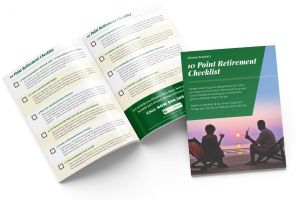What Level of Risk Is Right for Your Retirement Plan?
Have your question answered on the Money Wisdom Question Series!
In this week’s Money Wisdom Question Series, Ian Fergusson, RICP® addresses a fundamental concern for anyone approaching or in retirement: What level of risk is appropriate for my retirement plan?
There is no blanket answer to what the most appropriate risk is – it’s a very dynamic, moving target. Every individual, couple, or family will have a unique level of risk that aligns with their financial goals and personal comfort level.
Defining Risk Tolerance
To get to the heart of the matter, we need to define a couple of key terms. The first is risk tolerance, which is your willingness to take on risk from a behavioral and psychological standpoint.
For example, if you lean more conservatively, but you’re invested aggressively in the market, then there’s a disparity between your investments and your personal comfort level with risk. On the other hand, if you’re okay with market fluctuations but invested too conservatively, you might miss out on a long-term rate of return that better matches your comfort level.
Understanding Risk Capacity
The next term to understand is risk capacity, which is a financial and numerical calculation that determines your ability to take on risk.
If you’re earlier in your retirement savings journey and haven’t yet accumulated a large nest egg, your capacity for risk might be more limited. Conversely, if you’ve accumulated substantial assets, your capacity for risk is likely higher. This varies widely from person to person and must be evaluated individually.
Considering Risk Placement by Account Type
Another important consideration is where your risk is located, especially from an account type perspective. When the team at Johnson Brunetti designs, implements, and maintains financial plans for those entering and living through retirement, we ensure that each account type fits appropriately within the broader strategy.
Not only does each account serve a purpose in the overall structure, but it should also carry a risk profile that aligns with both the type of account and the role it plays in your retirement plan.
Download Now
10-Point Retirement Checklist
Here’s a checklist of our most important things you can do, to help you retire strong.

Information presented in our podcasts is considered current as of the created date. Over time, some information presented may become stale. We recommend you consult with your Financial Professional before making any changes based on information contained here.
Johnson Brunetti is a marketing name for the businesses of JB Capital and JN Financial.
Investment Advisory Services offered through JB Capital, LLC. Insurance Products offered through JN Financial, LLC.
The guarantees provided by any type of insurance contract are based on the claims-paying ability of the insurance company.
Related Resources
-
Paying Off Debt Before Retirement
In addition to maximizing your savings and putting together a comprehensive plan, an important task to check off your pre-retirement checklist is minimizing debt. Doing so both quickly and efficie… -
What Happens to My HSA When I Die?
A Health Savings Account (HSA) is a popular, tax-advantaged option within high-deductible health plans, allowing you to set aside pre-tax money for qualified medical expenses. Not only are contrib… -
When Is It Time to Retire?
Of all the dreams and decisions that go into planning your ideal retirement, perhaps the most difficult is deciding when to actually take the leap. Are you ready to retire in the next one to two y… -
Podcast Episode 418: 5 Financial Strategies from the NFL Playbook
Prefer to watch? Click here to watch and listen on YouTube. Football season is here, and so are the lessons you can borrow from the field to improve your financial game plan. Just like an NFL t… -
What Are the Biggest Regrets People Have in Retirement?
It’s natural to carry regrets through any stage of life, and retirement is no exception. When you’re making major decisions about your finances, your family, and your legacy, things can go off cou… -
Podcast Episode 417: Is Your 401(k) Enough for Retirement?
Prefer to watch? Click here to watch and listen on YouTube. For many savers, a 401(k) is a significant retirement asset, but is it enough to support you for 20 to 30 years without a paycheck? … -
Planning for the ‘What-Ifs’ of Long-Term Care
Nearly 70% of today’s 65-year-olds will need some form of long-term care in the future. Without proper planning, these expenses can quickly erode your retirement savings and put your financial sec… -
How Do I Budget for Healthcare Costs in Retirement?
Healthcare is often one of the largest expenses you’ll face in retirement. With costs continuing to rise, how can you create a budget that not only covers this significant expense but also support… -
What Age Should I Start Social Security?
Among the many decisions you’ll make in retirement, when to take Social Security is certainly one of the most impactful. You can collect Social Security as early as age 62, receive the full amount… -
Adjusting Your Money Mindset
An important shift must occur when you enter retirement: your money mindset needs a reset, and your financial strategies must evolve to match your new objectives. While growth is still important, …

